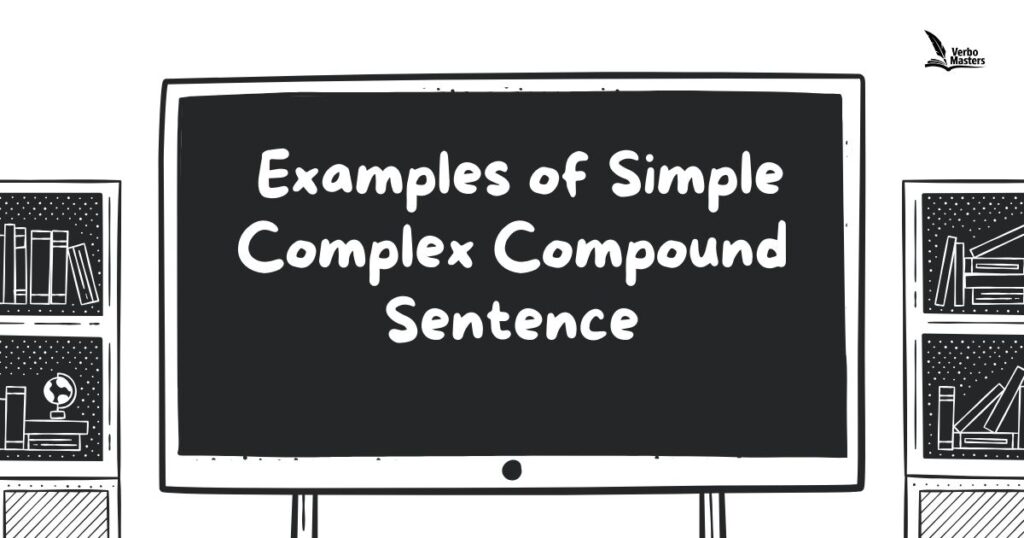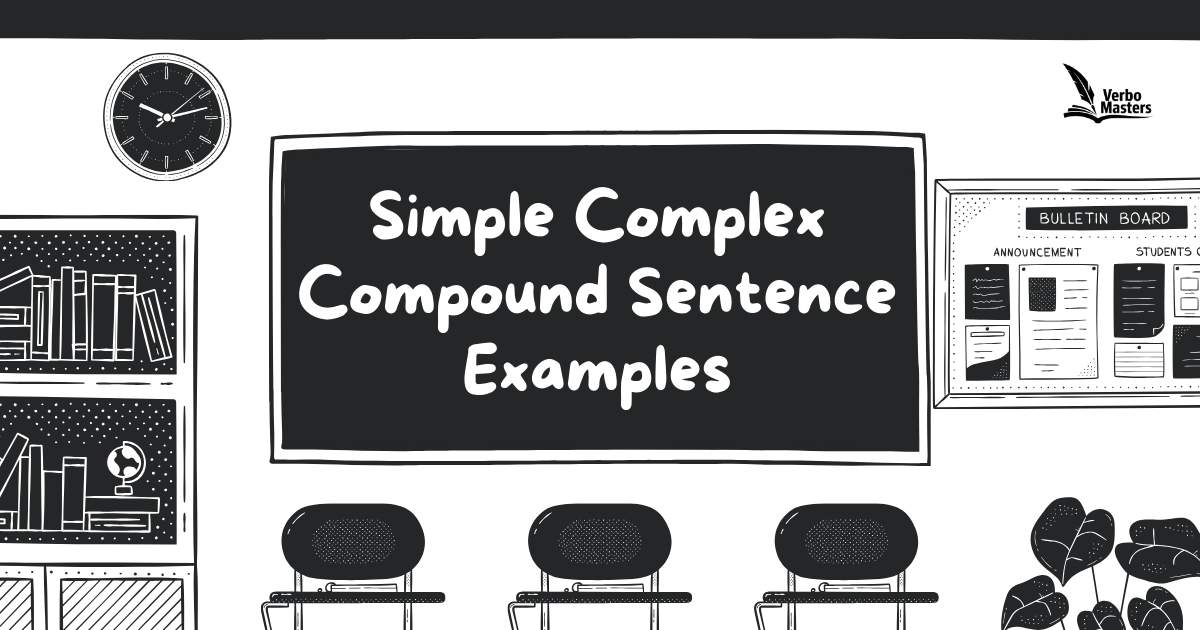Simple Complex Compound Sentence Examples! Sentences help us share our thoughts clearly. There are three main types of sentences. Simple sentences have just one idea. Compound sentences join two ideas together. Complex sentences connect ideas with extra details. Knowing these types makes writing stronger. They help make stories and essays more interesting. Let’s see some simple examples to understand them better!
You can also read; 10 Line Essay on My Family
1. Definition of a Simple Sentence
A simple sentence is a sentence that has only one independent clause. It contains a subject and a verb, and it expresses a complete idea. Even though it’s called “simple,” it can still include adjectives, adverbs, and objects. Simple sentences are clear, direct, and easy to understand. They are great for making writing strong and straightforward. Using simple sentences can also help keep readers focused on the main point.
Examples:
- The dog barked loudly.
- Sara plays the piano beautifully.
2. Definition of a Complex Sentence
A complex sentence is a sentence that has one independent clause and at least one dependent clause. The independent clause can stand alone, but the dependent clause cannot. These clauses are connected using words like “because,” “although,” “since,” or “when.” Complex sentences help show relationships between ideas. They make writing richer and more detailed. Using complex sentences can make your thoughts flow more smoothly.
Examples:
- I stayed home because it was raining.
- Although she was tired, she finished her homework.
3. Definition of a Compound Sentence
A compound sentence is made up of two or more independent clauses joined together. Each part could stand alone as a complete sentence. The clauses are usually connected by coordinating conjunctions like “and,” “but,” or “or.” Compound sentences are great for linking related ideas. They make writing more interesting and help ideas flow better. Using them can add variety and rhythm to your sentences.
Examples:
- I wanted to go for a walk, but it started to rain.
- She loves painting, and he enjoys playing music.
Examples of Simple Complex Compound Sentence

Simple Sentences
- I love chocolate.
- She reads every night.
- They play soccer after school.
- The sun is shining.
- We ate lunch together.
- He sleeps early.
- The baby is crying.
- The cat is sleeping.
- I lost my keys.
- She runs fast.
- Birds fly in the sky.
- My mom makes pancakes.
- The teacher smiles.
- John plays the guitar.
- The flowers bloom in spring.
- My friend called me.
- I watched a movie.
- It is raining outside.
- The river flows gently.
- He likes pizza.
- I finished my homework.
- The cake tastes good.
- We danced at the party.
- She sings beautifully.
- My dad drives to work.
- The dog barked loudly.
- The coffee is hot.
- She bought a new dress.
- I missed the bus.
- The stars are bright tonight.
- The boy laughed loudly.
- I found a wallet.
- My brother swims well.
- She paints lovely pictures.
- The shop is closed today.
- We love to travel.
- The ice melted quickly.
- I ride my bike every morning.
- He opened the window.
- My grandparents visited us.
Complex Sentences
- I went to bed early because I was tired.
- Although it was raining, we went hiking.
- She smiled when she saw the puppy.
- If you study hard, you will pass the test.
- Since I lost my keys, I couldn’t enter the house.
- When the show ended, we left the theater.
- I will call you after I reach home.
- Because he was late, he missed the bus.
- Although she was scared, she entered the room.
- If you need help, ask the teacher.
- Whenever I see you, I smile.
- Since we arrived early, we got good seats.
- Even though he was sick, he went to school.
- After she finished dinner, she watched TV.
- Before the sun sets, let’s reach the campsite.
- I stayed quiet although I knew the answer.
- As soon as he left, it started to rain.
- When you arrive, text me.
- Because the homework was hard, I needed help.
- Even if it snows, we will travel.
- After the rain stopped, we played outside.
- Since you asked nicely, I will help you.
- While she was studying, he was sleeping.
- If you are tired, take a nap.
- Although the test was hard, I passed it.
- Until the pizza arrives, we can watch a movie.
- Because I forgot my umbrella, I got wet.
- Since my phone died, I couldn’t call.
- If you listen carefully, you will learn.
- Though it was dark, we kept walking.
- After I clean my room, I will go out.
- Whenever it rains, I stay indoors.
- Because she loves dogs, she adopted three.
- If you water the plants, they will grow.
- Although he studied hard, he failed the exam.
- Until we meet again, take care.
- After the movie ends, let’s get ice cream.
- While the kids played, the parents talked.
- Since he apologized, I forgave him.
- Even though it was late, I finished my homework.
Compound Sentences
- I wanted tea, but he made coffee.
- She likes apples, and he likes oranges.
- We can watch a movie, or we can go shopping.
- It was raining, so we stayed indoors.
- He loves to swim, but I prefer running.
- I was hungry, so I made a sandwich.
- She wanted to stay home, but she had to work.
- The sun came out, and the rain stopped.
- We went to the park, and we had a picnic.
- He forgot his wallet, but I paid for him.
- I studied hard, so I passed the test.
- They can visit us now, or they can come later.
- She speaks French, and he speaks Spanish.
- I cooked dinner, and he set the table.
- It’s cold outside, but I forgot my jacket.
- We watched TV, and we ate popcorn.
- He is very talented, but he is very humble.
- You can stay here, or you can leave.
- I washed the car, and she cleaned the house.
- He runs fast, but he gets tired easily.
- I bought a new phone, and it works perfectly.
- She played the piano, and I sang along.
- I love books, but I don’t have time to read.
- We traveled by car, but they went by train.
- He made a cake, and I made cookies.
- I could go to the party, or I could stay home.
- She called me, and I answered quickly.
- The baby cried, and the mother picked him up.
- I painted the walls, and he fixed the door.
- She missed the train, so she took a taxi.
- I wanted a dog, but my parents said no.
- The birds chirped, and the sun rose.
- I brought snacks, and she brought drinks.
- He will come over, or I will visit him.
- I opened the window, and fresh air filled the room.
- She studied hard, and she got an A.
- He called me, but I missed the call.
- We finished early, so we went for ice cream.
- They arrived late, but they still had fun.
- I cleaned my room, and my mom was happy.
FAQ’s
What is a simple sentence?
A simple sentence has just one independent clause. It contains a subject and a verb and expresses one complete idea.
What is a complex sentence?
A complex sentence has one independent clause and at least one dependent clause. It shows a relationship between two ideas.
What is a compound sentence?
A compound sentence joins two independent clauses together using coordinating conjunctions like “and,” “but,” or “or.”
Why are simple sentences important?
Simple sentences are important because they make writing clear, direct, and easy to understand. They are perfect for strong, simple communication.
How does a complex sentence differ from a compound sentence?
A complex sentence connects one independent and one dependent clause, while a compound sentence joins two independent clauses.
What words often join complex sentences?
Words like “because,” “although,” “since,” and “when” often join parts of a complex sentence together.
Can a simple sentence be long?
Yes, a simple sentence can be long if it includes extra details like adjectives or objects, but it still has just one complete idea.
What are coordinating conjunctions?
Coordinating conjunctions are words like “and,” “but,” “or,” “so,” “yet,” “for,” and “nor” that link independent clauses in compound sentences.
Why use compound sentences?
Compound sentences help connect related ideas, making your writing smoother and more interesting to read.
How can I improve using these types of sentences?
Practice writing each type often. Mixing simple, compound, and complex sentences will make your writing more lively and strong.
Conclusion
Understanding simple, complex, and compound sentences can really boost your writing. They each have their own role and help share ideas clearly. Using them well makes your writing stronger and easier to follow.
By practicing often, you will become more comfortable with all three types. Mixing them keeps your stories and essays interesting. Start small, and soon it will feel natural and fun!

I’m John Smith, a language enthusiast dedicated to helping writers, students, and professionals master the art of clear and effective communication. Whether you’re looking for grammar tips, writing guides, or common mistake corrections, you’ll find valuable insights to improve your language skills. Let’s make grammar simple and fun!

